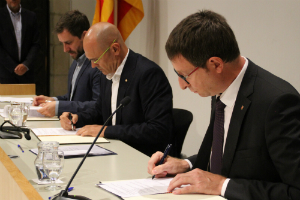- The Programme, promoted by the ministries of Health, Justice and Transparency, Foreign and Institutional Relations and Affairs, will use a database of genetic profiles to enable the Government to carry out comprehensive genetic profile crossing and establish relationships and determine personal identification of the remains
- Access to the Programme will be free of cost and available to anyone registered in the Census of missing relatives

Last week, the Minister of Transparency and Foreign and Institutional Relations and Affairs, Raül Romeva, the Minister of Health, Antoni Comin, and the Minister of Justice, Carles Mundó, presented the Genetic Identification Programme to run a database of genetic profiles of relatives of missing persons from the Spanish Civil War. The Programme also aims to establish family relationships and determine personal identification of the remains.
The Genetic Identification Programme is an initiative coordinated and promoted by the Ministry of Transparency, Foreign and Institutional Relations and Affairs, in cooperation with the Ministry of Health and the Ministry of Justice. On Wednesday, the Catalan ministers signed various agreements necessary to enable the Programme, including an initial cooperation agreement between the three departments; a second agreement specifically between the Ministry of Transparency, Foreign and Institutional Relations and Affairs and the Ministry of Health to for the sampling and analysis of biological tissue of relatives for it to be contrasted with genetic data from analyses of missing persons’ remains; and a final agreement signed between the ministries of Foreign Affairs and Justice to ensure the technical assistance from the Institute of Legal Medicine and Forensic Sciences of Catalonia (IMLCFC) for the anthropological analysis of human skeletal remains.
For the Government it is a duty to locate, recover and identify the remains of missing persons in Catalonia during the Civil War and Franco dictatorship, a duty supported by the current and legitimate social demand. The Programme is a bold, comprehensive and long-term project, and the first of its kind to be carried out in the territories that experienced the Civil War and the dictatorship.
Minister Romeva underlined that honouring our historical memory is a "duty and a right that has to do with our dignity today, the quality of our democratic system, the density of our capacity to live together and strength of our identity”. According to the Minister of Foreign Affairs, "today, we all deserve the country we are aspiring to build" and "only with the clear facts of the past can we look forward with a fresh eyes and the necessary composure to face our future as a country".
Romeva publicly thanked the Ministers of Health and Justice for their willingness to co-operate in this Programme and noted that "the agreements signed today are a step forward for Catalonia in putting an end to a basic democratic deficit. In this regard, he also stressed that it is a "pioneering endeavour" among the territories that underwent the Civil War, and that by doing so, Catalonia is leading the way "in the path to honour the memory of the victims of the Civil War".